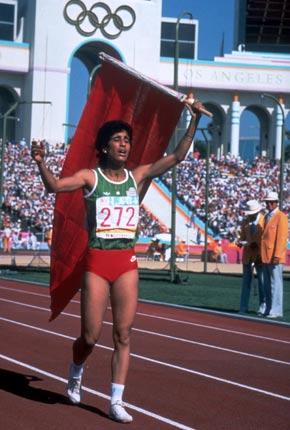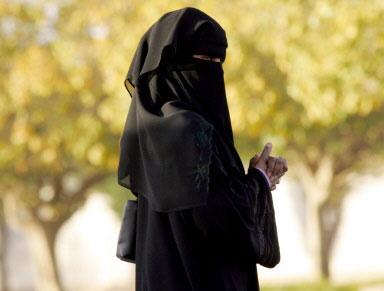Arab Women Athletes Must Fight To Compete
 Nawal el-Moutawakel (right), the first Arab Muslim woman to win an Olympic gold medal, on Tuesday called on female athletes in the Gulf to fight for their right to compete, as Kuwaiti lawmakers attempt to ban their national women’s football team.
Nawal el-Moutawakel (right), the first Arab Muslim woman to win an Olympic gold medal, on Tuesday called on female athletes in the Gulf to fight for their right to compete, as Kuwaiti lawmakers attempt to ban their national women’s football team.“There is resistance, it is not easy for women to get a red carpet ... So women have to fight for their right,” Moutawakel told reporters at a press conference to kickstart the Laureus World Sports Awards in Abu Dhabi.
Moutawakel, a member of the International Olympic Committee (IOC) and Laureus World Sports Academy, won the inaugural women's 400m hurdles event for Morocco at the 1984 Summer Olympics in Los Angeles.
“It is very difficult (for women to compete) and I know when I speak about this. My event was the 400m hurdles with many barriers. There are ups and downs, it’s not always flat and smooth.”
Islamist lawmakers in Kuwait have called for an investigation into how their national women’s football team was allowed to take part in a tournament in Abu Dhabi last month.
MPs in the conservative Muslim country want the team banned and the government to punish officials responsible for allowing the team to compete in the West Asian Football Federation Championship.
The lawmakers are against the women taking part in any outdoor sporting activity.
“This is a minor problem that needs to be solved internally. There is always turbulence in the air, but the landing will be smooth,” Moutawakel said.
She said Arab women have made huge progress in the world of sport since she was competing, describing the difference as “like night and day”.
Click here to read the full story:
By Dylan Bowman
Maktoob Sport
Related links:
More About The Olympics on AWR
 The decision to leave my country came after I knocked on many doors of the Saudi bureaucracy, hoping in vain to obtain the God-given right to live with my Arab-Canadian husband in the country of my birth.
The decision to leave my country came after I knocked on many doors of the Saudi bureaucracy, hoping in vain to obtain the God-given right to live with my Arab-Canadian husband in the country of my birth. When darkness comes to Congo Town, women in crisp uniforms take the streets, patrolling with Kalashnikov rifles and long, black hair tucked into baby-blue caps.
When darkness comes to Congo Town, women in crisp uniforms take the streets, patrolling with Kalashnikov rifles and long, black hair tucked into baby-blue caps. UPDATE: Katheryn Bigelow is first woman to win Oscar for Best Director in 82-year history of the awards. Brava Kathryn Bigelow! We love you.
UPDATE: Katheryn Bigelow is first woman to win Oscar for Best Director in 82-year history of the awards. Brava Kathryn Bigelow! We love you. Today on a daily basis, personal memoirs of ongoing encounters of dictatorship and resistance in Iran are being written in print and in cyberspace by countless Iranian civil rights activists, scholars and women human rights defenders.
Today on a daily basis, personal memoirs of ongoing encounters of dictatorship and resistance in Iran are being written in print and in cyberspace by countless Iranian civil rights activists, scholars and women human rights defenders.